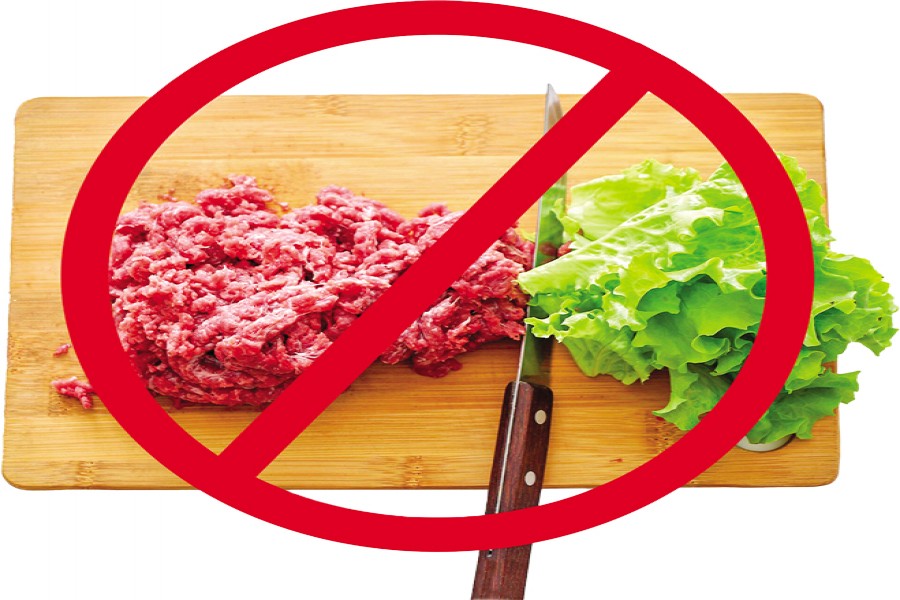
Published :
Updated :

It was the second day of Eid-ul-Adha in a modest apartment in Dhaka. The aroma of beef curry filled the air as Fatema Begum busily moved between the stove and a bucket of freshly cut raw Qurbani meat.
Amid the rush, her youngest son grabbed a handful of salad-prepared earlier and placed uncovered near the cooking place. By evening, he had developed a high fever and stomach cramps. A doctor later confirmed what Fatema hadn't anticipated, the child had consumed contaminated salad, likely tainted by bacteria from the nearby raw meat.

This foodborne illness is likely caused by cross-contamination - a silent but serious risk that surfaces in countless households during the Qurbani season.
Fatema's story is not just a story; it's our reality. Every year, during Eid-ul-Azha, thousands of households across Bangladesh handle large quantities of freshly slaughtered meat in home kitchens.
Many are fully aware of the silent health risks that accompany poor hygiene practices. One of the most dangerous yet preventable forms of contamination is cross-contamination, the transfer of harmful bacteria from raw meat to other food items, surfaces, or hands, often unnoticed until someone falls ill.
Cross-contamination refers to the transfer of harmful pathogens from raw meat, utensils, or surfaces to other foods, posing a serious risk of foodborne illnesses.
During Eid, when households handle large volumes of fresh beef, the likelihood of such contamination rises markedly, underscoring the need for vigilant food safety practices.
Why is Cross-contamination a concern during Eid?
On Eid, there is an increase in the preparation of meat, so people are handling more raw meat at both homes and community centres.
Raw meat often contains bacteria such as Salmonella, E. coli and Campylobacter. Without proper hygiene, these bacteria can contaminate cooked food, vegetables, or the hands of the cook.
Most of the Qurbani meat in Bangladesh is prepared and cooked in household kitchens where hygiene levels may vary.

For instance, using the same cutting board or knife for meats you have not cooked and for food, you're already eating or handling and then touching food without washing your hands can cause bacteria to spread.
Carelessly placing raw meat in the fridge can cause meat juices to contaminate prepared foods, thereby increasing the risk of foodborne illness.
The World Health Organisation reports that hundreds of millions of people worldwide fall ill from foodborne diseases, with many cases resulting from inadequate food handling practices. At times like Eid, when food handlers handle more meat than usual, the risk of infection can increase significantly (WHO, 2015).
Common vectors of cross-contamination
Raw meat
These can contaminate hands, kitchen tools, and surfaces if not handled with care.
Improper hand hygiene
Handling raw meat without thorough hand washing can spread bacteria to other foods or surfaces.
Shared utensils
Using the same knives and cutting boards for both raw and cooked foods without proper sanitisation can lead to contamination.
Inadequate storage
Storing raw meat improperly can cause drippings to contaminate other foods. A study in Bangladesh found that during Eid, household meat processing is often contaminated with bacteria such as Staphylococcus aureus and Listeria monocytogenes.
They make it evident that everyone needs to increase hygiene awareness. Gastrointestinal issues such as diarrhoea, nausea, vomiting and stomach pain are usually what you experience from foodborne illnesses caused by cross-contamination.
Even though many people recover normally, some groups, like kids, ageing people, pregnant women and immunocompromised individuals, have a higher chance of becoming seriously ill.
Outbreaks of food poisoning during Eid not only halt celebrations but also place extra demands on public health teams. Ensuring kitchen hygiene and preventing cross-contamination during Eid is achievable through practical steps.
Separate equipment and sanitise thoroughly
Dedicate cutting boards and knives exclusively for raw meat and others for cooked or ready-to-eat foods. Also, clean all utensils and surfaces with hot, soapy water, followed by a mild bleach solution for effective disinfection.
Frequent handwashing with proper storage
Wash hands with soap and water before and after handling raw meat. Store raw meat in sealed containers at the bottom of refrigerators to prevent drips onto other foods.
Adequate Cooking and waste management
Cook meat to the recommended safe internal temperature (75°C or 165°F) to eliminate pathogens. Promptly discard raw meat scraps and packaging materials to minimise bacterial growth.
Sacrifice on the day of Eid-ul-Azha plays a vital role in culture and faith. Due to this, promoting food safety measures requires cooperation among community leaders, religious authorities, and public health professionals. Creating culturally specific awareness can encourage people to stay clean without disrupting the main features of the festival.
Besides faith, sacrifice, and generosity generosity, Eid-ul-Azha should also emphasise health and safety.
During Qurbani, cross-contamination in the kitchen can occur quietly and cause foodborne illnesses that spoil the occasion for everyone. Recommended steps for food safety can help ensure that families across the country enjoy a healthy and unforgettable Eid holiday.
jarinrafa20@gmail.com


 For all latest news, follow The Financial Express Google News channel.
For all latest news, follow The Financial Express Google News channel.